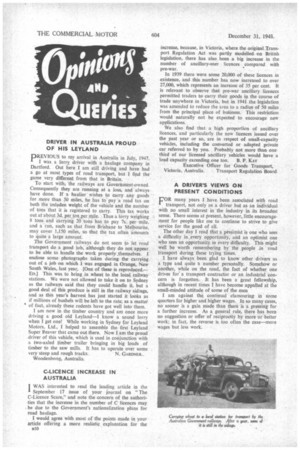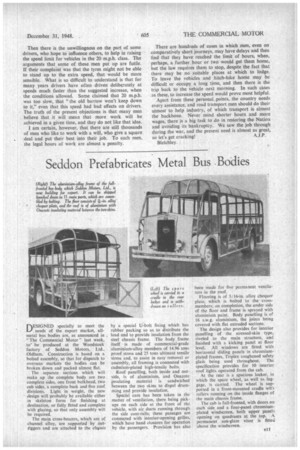DRIVER IN AUSTRALIA PROUD OF HIS LEYLAND
Page 44

Page 45

If you've noticed an error in this article please click here to report it so we can fix it.
PREVIOUS to my arrival in Australia in July, 1947, I was a lorry driver with a haulage company in Dartford. Out here I am still driving. and have had a go at most types of road transport, but I find the game very different from that in Britain.
To start with, the railways are Government-owned. Consequently they are running at a loss, and always have done. If a haulier wishes to carry any goods for more than 50 miles, he has to-pay a road tax on both the unladen weight of the vehicle and the number of tons that it is registered to carry. This tax works out at about 3d. per ton.per mile. Thus a lorry weighing 8 tons and carrying 20 tons has to pay 7s. per mile, and a run, such as that from Brisbane to Melbourne. may cover 1,150 miles, so that the tax often amounts to quite a large amount.
The Government railways do not seem to let road transport do a good job, although they do not appear to be able to handle the work properly _themselves. I enclose some photographs taken during the carrying out of a job on which 1 was engaged in Orange, New South Wales, last year [One of these is reproduced.— ED.] This was to bring in wheat to the local railway stations. We were not allowed to take it on to Sydney as the railways said that they could handle it, but a good deal of this produce is still in the railway sidings, and as this year's harvest has just started it looks as if millions of bushels will be left to the rats; as a matter of fact, already these rodents have got well into them.
I am now in the timber country and am once more driving a good old Leyland—I know a sound lorry when I get one! While working in Sydney for Leyland Motors, Ltd:, I helped to assemble the first Leyland Super Beaver that came out there. Now I.am the proud driver of this vehicle, which is used in conjunction with
two-axled timber trailer bringing in big toads of timber to the saw mills. It has to operate over some
very steep and rough tracks. N. GARDNER.. Woodenbong, Australia.
C-LICENCE INCREASE IN AUSTRALIA
I WAS interested to read the leading article in the September 17 issue of your journal on "The C-Licence Scare," and note the concern of the authorities that the increase in the number of C licences may
• be due to the Government's nationalization plans for road haulage.
I would agree with most of the points made in your article offering a more realistic explanation for the al0 increase, because, in Victoria, where the original Transport Regulation Act was partly modelled on British legislation, there has also been a big increase in the number of ancillary-user licences .compared with pre-war.
In 1939 there were some 20,000 of these licences in existence, and this number has now increased to over 27,000, which represents an increase of 35 per cent. It is relevant to observe that pre-war ancillary licences permitted traders to carry their goods in the course of trade anywhere in Victoria, but in 1941 the legislation was amended to reduce the area to a radius of 50 miles from the principal place of buSiness. This restriction would naturally not be expected to encourage new applications.
We also find that a high proportion of ancillary licences, and particularly the new licences issued over the past year or so, are in respect of small-capacity vehicles, including the converted or adapted private car referred to by you. Probably not more than onethird of our licensed ancillary vehicles would have a
load capacity exceeding one ton. B. P. KAY Executive Officer for Goods Transport,
Victoria, Australia. Transport Regulation Board A DRIVER'S VIEWS ON • PRESENT CONDITIONS
' FOR many years I have been associated with road transport, not only as a driver but as an individual with no small interest in the industry in its broadest sense. There seems at present, however, little encouragement for people like me to continue to strive to give service for the good of ail.
The other day I read that a pessimist is one who sees a difficulty in every opportunity, and an optimist one who sees an opportunity in every difficulty. This might well be worth remembering by the people in road transport during these trying times.
I have always been glad to know other drivers as a type and quite a number personally. Somehow or another, while on the road, the fact of whether one drives for' a transport contractor or an industrial concern is forgotten. It has been a great fellowship, although in recent times I have become appalled at the small-minded attitude of some of the men I am against the continual clamouring in some quarters for higher and higher wages. In so many cases, no sooner is a gain made than there is a pressing for a further increase. As a general rule, there has been no suggestion or offer of reciprocity by more or better work; in fact, the reverse is too often the case—more wages but less work. Then there is the unwillingness on the part of some drivers, who hope to influence others, to help in raising the speed limit for vehicles in the 20 m.p.h. class. The arguments that some of these men put up are futile. If their complaint was that the tyres might not be able to stand up to the extra speed, that would be more sensible. What is so difficult to understand is that for many years drivers have often driven deliberately at speeds much faster than the suggested increase, when the conditions allowed. Some claimed that 20 m.p.h. was too slow, that "the old barrow won't keep down to it," even that this speed had bad effects on drivers. The truth of the present objections is that many men believe that it will mean that more work will be achieved in a given time, and they do not like that idea.
I am certain, however, that there are still thousands of men who like to work with a will, who give a square deal and put their best into their job. To such men. the legal hours of work are almost a penalty. There are hundreds of eases in which men, even on comparatively short journeys, may have delays and then find that they have reached the limit of hours, when, perhaps, a further hour or two would get them home, but the law requires them to stop, despite the fact that there may be no suitable places at which to lodge. To leave the vehicles and hitch-hike home may be difficult or occupy a long time, and then there is the trip back to the vehicle next morning. In such cases as these, to increase the speed would prove most helpful.
Apart from these personal.points, the country needs every assistance, and road transport men should do their utmost to help industry, of which transport is almost the backbone. Never mind shorter hours and more wages, there is a big task to do in restoring the Nation and avoiding its bankruptcy. We saw the job through during the war, and the present need is almost as great, so let's get cracking! A.J.P. Bletchley.




























































































